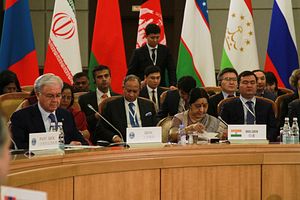India became a full member of the Shanghai Cooperation Organization (SCO) at the Astana Summit on June 8-9, 2017. The declaration of China and Russia on May 31, 2017, was the last milestone in India’s membership quest. After becoming a full member, External Affairs Minister Sushma Swaraj attended the 16th Meeting of Council of SCO Heads of Governments in Sochi, Russia on November 30 and December 1 this year. The highlights of her speech included urging on the fight against terrorism, improving connectivity, and energy.
Trade
India’s membership in the SCO provides it with select opportunities in the geoeconomic and the geostrategic sphere in the Central Asian Region (CAR). The CAR supplies around 10 percent of oil and energy to the world. With India being one of the most energy-hungry nations, involvement in the SCO provides it with an opportunity to satisfy its energy requirements through regional diplomacy. India’s pending energy projects like the TAPI (Turkmenistan-Afghanistan-Pakistan-India) pipeline, IPI (Iran-Pakistan-India) pipeline, and CASA (Central Asia-South Asia)-1000 electricity transmission projects — all of which are blocked, due in part to Pakistan’s recalcitrant approach — can get a much needed push through the SCO.
Historically Central Asia has exerted influence on India through art, culture, language, religion, and trade. The Mughal dynasty, with roots in the CAR, even ruled India from 1526 to 1857. But India’s bilateral economic relations with Central Asian countries since their independence continues to be modest. In 2013, India’s trade with Central Asian countries was as low as $500 million. The SCO can provide a platform for India to improve its bilateral relations with the Central Asian countries. The grouping is planning to initiate negotiations on the SCO FTA by 2020; it would be unwise for India to miss out on this opportunity.
One of the crucial reasons for the lack of flourishing of trade between India and Central Asian states is that there is no direct access. India has to either trade with Central Asia through China or through Europe via Russia, thus making it an expensive affair. Chabahar port in Iran has provided some convenience but in a limited way. India could look to use the SCO for exploring an alternative route to the CAR.
Security
In the sphere of security, the SCO formed Regional Anti-Terrorism Structure (RATS) in 2005 at Tashkent. RATS which works on information sharing and joint counterterrorism measures between member states. The SCO has successfully nullified 600 would-be attacks and extradited more than 500 terrorist through the RATS mechanism. India’s full membership in the SCO will enable it to play an instrumental role in RATS. As Swaraj noted in her speech, India through RATS can improve its counterterrorism experience, by working toward intelligence sharing, law enforcement, developing best practices and technologies, mutual legal assistance, extradition arrangements and capacity building amongst other measures. Through the SCO, India can also work on anti-drug trafficking, which is a major concern for Afghanistan.
The re-emergence of radicalism in Afghanistan, particularly the presence of the Islamic State, will have a major impact on the already tense Kashmir region of India. Thus India, being a major stake holder in Afghanistan, alongside the SCO, will have to help fill the security vacuum left after the NATO withdrawal. India has already spent more than $2 billion in investments and aid in Afghanistan. India’s full membership in the SCO will allow it to have a pivotal say on the issue.
Diplomatic Challenges
But Indian involvement in the SCO is not as simple as it looks. Alongside India, Pakistan was accepted as a full member at the Astana Summit and participated in the 16th Meeting of Council of SCO Heads of Governments. Plus, China is the principal driver of the SCO. The presence of Pakistan and the dominance of China in the SCO limit India to a secondary role in the organization.
It is yet to be seen whether India’s membership in the SCO will comes at the expense of China’s interest in Indian-led organization, such as the Bay of Bengal Initiative for Multi-Sectoral Technical and Economic Cooperation (BIMSTEC) or the South Asian Association for Regional Cooperation (SAARC). China’s membership in these organizations could dilute India’s position as well as its influence in the region.
Also the presence of Pakistan and China in the SCO limits India’s ability to push on the issue of terrorism, as Pakistan itself has indulged in a major proxy war with India. China has repeatedly shielded terrorists from Pakistan in the United Nations Security Council with its veto power. It will also be interesting to view India’s response if Pakistan tries to regionalize the Kashmir issue through the SCO. India will also have to tread carefully should China raise the Tibet issue at the SCO, as India has given shelter to the Dalai Lama for decades.
Finally, the SCO has traditionally adopted a clear anti-Western posture. It is important for India to identify itself distinctly and avoid such rhetoric, which the SCO promotes.
Indian’s benefits from the SCO will be limited due to the role of China and Pakistan in the organization. Positive outcomes will depend on how Indian diplomacy deals with its rivals. On the other hand, India-Russia diplomatic relations will have a major role in promoting India’s interests in the SCO, and India’s cordial relations with Central Asian countries will determine the fate of India’s interests.
India has to concede the fact that the CAR is China’s sphere of influence and India’s engagement with the region should proceed with utmost caution. Thus India’s full membership and subsequent involvement in the SCO comes with limited opportunities and many challenges. The Modi government will have to walk a thin diplomatic line and adopt a careful approach while engaging in the SCO. It has to take care of its interests and remain neutral on issues which are not directly related to it.
Suyash Desai is a PhD Scholar in the Center for International Politics, Organization and Disarmament (CIPOD), Jawaharlal Nehru University. His twitter handle is @Suyash_Desai

































